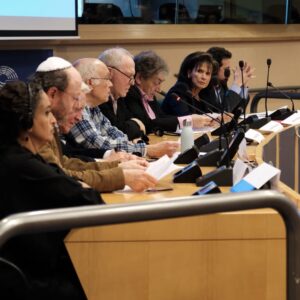It is not going to be easy. It could even get athletic. Beyond the question of the actual men and women, what is really important is that this process of the appointment of the new Commission give us the chance to stop confusing immigration with the protection of the European model, and especially, not entrust the enlargement and neighbourhood policies to an Orbanite. This is what logic dictates, but what happens after these indispensable debates are over?
Once the Parliament fine-tunes this project and the Commission is in place, the question of giving a new momentum to the union will come to the fore. France, the Renew group and Mrs Von der Leyen have supported the idea of setting up a Conference whose task is to reflect, to define the priorities and to make proposals to the Member States and their citizens.
This idea is welcome. It would be excellent if the members of this Conference were chosen by random draw so that it directly resonates the voices of the citizens of the union, but it will not be enough. To open up new horizons, the national governments should make their parallel propositions too, in order to give food for thought and to make clear what they are ready to actually consider and what sovereignties they are ready to give up and share for the sake of making their European goals a reality.
For this, direct democracy and representative democracy should go hand in hand. The Conference risks becoming empty words and disappointment if they do not, but who today will take such an initiative?
At normal times it would fall on FrancoGermany, the two engines of the union, allied with Italy, the third European power, given that Great Britain seems to want to break off from its history, its roots and its interests. This would be the best setup, but Mrs Merkel is about to leave, too occupied with sorting out her succession to take real initiatives, while the fragility of the new Italian coalition condemns Italy to hold herself back on European questions. As for Spain, she is in search for herself. The Dutch and the Scandinavians are suspicious of everything that could lead to more EU-expenditure, and so, it leaves us with France, the country whose president has both time on his hands and willingness to act.
Conference or not, the question whether this project can see the light of day depends on Emmanuel Macron putting three, four or five goals on the table that he proposes for the union. One should concern the climate because this is the battle about our survival and the most consensual one of all the political priorities. The second: the Common Defence. The third: common investments in one or several industries of the future. The fourth: co-development with the South Mediterranean region, and the fifth: our relations with the Russian Federation, the other pillar of the continent.
The day when the front line of the 28 or 27 Member States agree on these or a part of these objectives for ten or fifteen years the institutional question will sort itself out. Then we would become a multispeed union of concentric circles, with a political union at the heart of a common market which itself is cemented in the values of liberal democracy.


